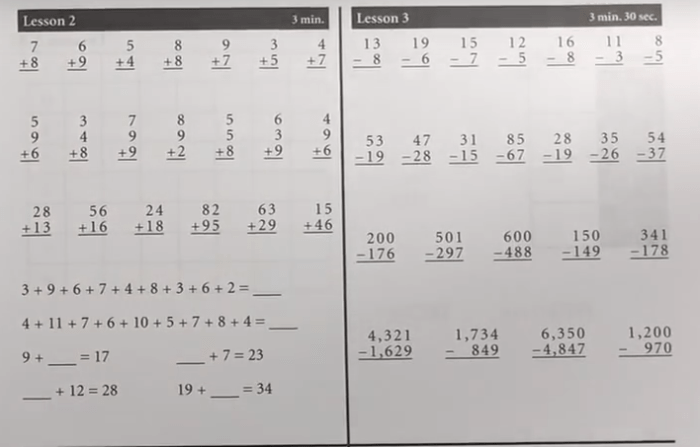Get ready to conquer the Abeka Business Math Test 2 with this comprehensive guide! Dive into the world of business math and unlock the key concepts and skills that will empower you to excel in this crucial assessment.
We’ll explore the test format, sample questions, and effective strategies to help you tackle the challenges with confidence. Plus, we’ll reveal the practical applications of these concepts in real-world business scenarios.
Abeka Business Math Test 2: Overview
The Abeka Business Math Test 2 is designed to assess students’ understanding of various business math concepts.
The test covers topics such as financial analysis, statistics, and probability. It consists of multiple-choice questions, short answer questions, and word problems.
Test Format
The test is divided into two sections:
- Section 1: Multiple-choice questions (50 questions)
- Section 2: Short answer questions and word problems (25 questions)
Duration and Difficulty
The test is timed, with a total duration of 90 minutes.
The difficulty level of the test is moderate, with questions ranging from basic to challenging.
Key Concepts and Skills

Abeka Business Math Test 2 assesses your understanding of essential business math concepts and skills. Mastering these concepts is crucial for success in business operations, as they provide the foundation for making informed decisions, managing financial resources effectively, and analyzing business performance.
The test covers a wide range of topics, including:
Number Systems and Conversions
- Converting between different number systems (decimal, binary, octal, hexadecimal)
- Understanding the role of number systems in computer science and data representation
Measurement and Estimation
- Using and converting between different units of measurement (length, weight, volume, time)
- Estimating quantities and making approximations
Ratios, Proportions, and Percentages
- Calculating ratios, proportions, and percentages
- Applying ratios and proportions to solve business problems
- Using percentages to represent and compare data
Algebraic Expressions and Equations
- Simplifying algebraic expressions
- Solving linear equations and inequalities
- Using algebraic equations to model and solve business problems
Geometry and Trigonometry
- Calculating the area, perimeter, and volume of geometric shapes
- Using trigonometry to solve problems involving angles and distances
Statistics and Probability
- Collecting, organizing, and interpreting data
- Calculating measures of central tendency (mean, median, mode)
- Using probability to predict outcomes and make decisions
Financial Mathematics
- Calculating interest, annuities, and present/future value
- Understanding the time value of money
- Making financial decisions based on mathematical calculations
Sample Questions and Solutions
The Abeka Business Math Test 2 comprises various question types covering key concepts and skills. To enhance understanding and preparation, this section presents sample questions along with detailed solutions and explanations.
The questions are organized into s, each focusing on a specific aspect of business mathematics. By working through these questions, you can reinforce your knowledge, identify areas for improvement, and gain confidence for the actual test.
Discounts and Markups
Discounts and markups are essential concepts in business transactions. This provides a sample question that tests your ability to calculate discounts and markups accurately.
- Question:A retailer purchases a product for $50 and sells it for $75. Calculate the markup percentage.
- Solution:
- Markup = Selling Price – Cost Price
- Markup = $75 – $50
- Markup = $25
- Markup Percentage = (Markup / Cost Price) x 100
- Markup Percentage = ($25 / $50) x 100
- Markup Percentage = 50%
Test-Taking Strategies
Navigating the Abeka Business Math Test 2 requires a well-planned approach to maximize success. By implementing effective test-taking strategies, you can manage your time wisely, prioritize questions, and avoid common pitfalls that may hinder your performance.
Effective time management is crucial. Allocate a specific amount of time to each section of the test, ensuring you don’t spend excessive time on any one question. Prioritize questions based on your strengths and areas of confidence. Attempt the easier questions first to build momentum and boost your confidence.
Question Selection
Carefully read each question and identify the key concepts being tested. Determine the type of question (multiple choice, short answer, or problem-solving) and approach it accordingly. For multiple-choice questions, eliminate obviously incorrect options first to narrow down your choices. For short answer questions, be concise and provide only the necessary information.
After completing the Abeka Business Math Test 2, I was curious about how it related to other topics. I stumbled upon a discussion about CNA Progression 2 Unit 5 , which covers patient care skills. While different in focus, I noticed some underlying principles that connect these subjects, such as critical thinking and problem-solving abilities.
This realization made me appreciate the interconnectedness of knowledge and how it can be applied in various fields, including healthcare and business.
For problem-solving questions, show your work clearly and logically to demonstrate your understanding of the concepts involved.
Common Pitfalls
Avoid common pitfalls that can derail your performance. Rushing through the test without carefully reading the instructions can lead to errors. Guessing blindly without attempting to solve the problem reduces your chances of getting the correct answer. Relying solely on your memory without understanding the underlying concepts can make you vulnerable to trick questions.
By implementing these effective test-taking strategies, you can approach the Abeka Business Math Test 2 with confidence, maximizing your potential for success.
Preparation Tips
Preparing for the Abeka Business Math Test 2 can be daunting, but with the right approach, you can set yourself up for success.
Start by reviewing the course materials thoroughly, paying attention to key concepts and formulas. Additionally, utilize online resources such as practice questions and mock tests to enhance your understanding.
Study Materials
- Abeka Business Math Textbook
- Online practice tests
- Flashcards for key concepts and formulas
Practice Exercises
- Solve practice problems from the textbook and online sources.
- Time yourself to improve your speed and accuracy.
- Review your mistakes and focus on areas where you need improvement.
Study Strategies, Abeka business math test 2
- Break down complex concepts into smaller, manageable chunks.
- Use flashcards to memorize formulas and key terms.
- Form study groups with classmates to discuss concepts and solve problems together.
Applications in Business

The concepts tested in the Abeka Business Math Test 2 are not mere theoretical constructs but rather indispensable tools that empower individuals to navigate the dynamic world of business. These skills are applied across a wide spectrum of business operations, enabling decision-makers to analyze data, make informed judgments, and ultimately drive success.
Financial Analysis
The ability to analyze financial statements is crucial for assessing a company’s financial health and performance. By understanding concepts like balance sheets, income statements, and cash flow statements, business professionals can evaluate profitability, solvency, and liquidity. This knowledge is vital for making informed investment decisions, managing cash flow, and planning for future growth.
Cost Accounting
Cost accounting provides a framework for tracking, analyzing, and allocating costs incurred by a business. This information is essential for determining product profitability, optimizing production processes, and making informed pricing decisions. Business professionals who master cost accounting principles can gain a competitive advantage by identifying areas of cost savings and improving operational efficiency.
Budgeting and Forecasting
Budgeting and forecasting are critical planning tools that enable businesses to set financial goals, allocate resources, and anticipate future cash flow needs. By developing and analyzing budgets and forecasts, business professionals can make informed decisions about investments, staffing levels, and overall financial strategy.
This foresight helps businesses stay on track, adapt to changing market conditions, and achieve long-term success.
Detailed FAQs: Abeka Business Math Test 2
What is the purpose of the Abeka Business Math Test 2?
The Abeka Business Math Test 2 assesses your understanding of fundamental business math concepts and your ability to apply them in practical business situations.
How long is the Abeka Business Math Test 2?
The test typically lasts for 60 minutes.
What types of questions are on the Abeka Business Math Test 2?
The test covers a range of topics, including profit and loss, interest calculations, discounts, depreciation, and inventory management.
What are some tips for preparing for the Abeka Business Math Test 2?
Review the key concepts, practice solving sample questions, and familiarize yourself with the test format.